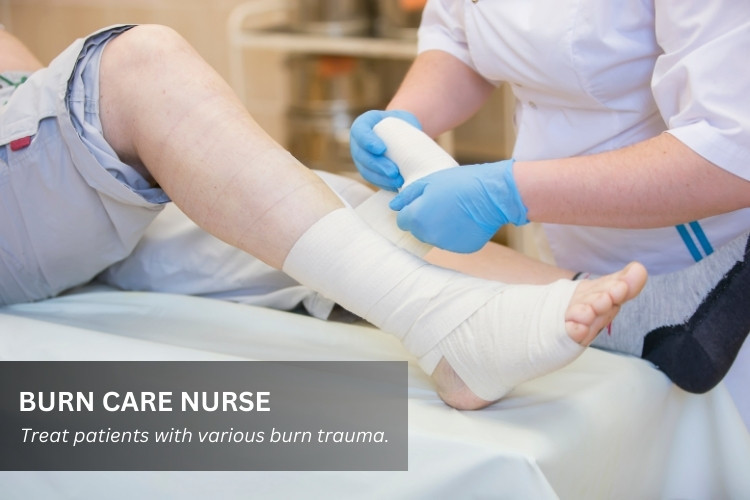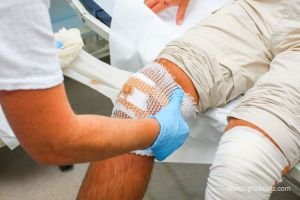Burn Care Nurse Career Guide

Overview
What Is a Burn Care Nurse?
A Burn Care Nurse is a Registered Nurse (RN) who specializes in providing care to patients who have sustained burn injuries. These nurses manage all aspects of burn care, from initial assessment and wound care to pain management and long-term rehabilitation. Burn Care Nurses play a critical role in the recovery and rehabilitation of burn patients, providing both physical and emotional support throughout the healing process.
Burn Care Nurses work in specialized burn units, trauma centers, hospitals, and outpatient clinics. They care for patients with varying degrees of burns, from minor to severe, and work closely with other healthcare professionals, such as burn surgeons, physical therapists, and mental health specialists.
This career requires specialized knowledge in wound healing, pain management, and psychological support, as burn care is a highly technical and emotionally challenging field.
Education
How To Become a Burn Care Nurse
Becoming a Burn Care Nurse requires a combination of traditional nursing education, clinical experience, certification, and specialized training in a critical care setting. Follow these steps to enter this challenging and rewarding healthcare career:
- Earn a Nursing Degree. Complete an Associate Degree in Nursing (ADN) or a Bachelor of Science in Nursing (BSN). A BSN is preferred for specialized roles like burn care nursing, especially in larger healthcare settings.
- Pass the NCLEX-RN. Obtain your nursing license by passing the National Council Licensure Examination for Registered Nurses (NCLEX-RN).
- Gain Clinical Experience. Work as a Registered Nurse (RN) in emergency rooms, trauma units, or intensive care units (ICU) to build a foundation in critical care nursing.
- Obtain Specialized Burn Care Training. Take continuing education courses in burn care and wound management. Many burn centers offer specific training programs for nurses to learn advanced burn treatment techniques and procedures.
- Optional Certification. Consider becoming a Certified Burn Nurse (CBRN) through the American Burn Association (ABA) to demonstrate your expertise and enhance your job prospects.
How long does it take to become a Burn Care Nurse? On average, it takes 4-6 years to become a Burn Care Nurse, including nursing education, licensure, and clinical experience. Certification in burn care is optional but adds to a nurse's credibility and expertise in this specialized field.
Average Salary
How Much Does a Burn Care Nurse Make?
Salaries for Burn Care Nurses vary based on location, experience, and work setting. On average, a Burn Care Nurse can expect to earn between $75,000 and $100,000 annually.
Average annual salary for a Burn Care Nurse:
- Entry-level: $75,000 - $85,000 per year.
- Mid-career: $85,000 - $95,000 per year.
- Experienced: $95,000 - $100,000+ per year.
The U.S. Department of Labor reports that Registered Nurses earn an average of $42.00 per hour, or approximately $87,360 annually. Burn Care Nurses in trauma centers or burn units may earn higher wages due to the complexity of care and the high-stress environment.
Job Duties
What Does a Burn Care Nurse Do?
Burn Care Nurses are responsible for managing the acute care of burn patients, which includes everything from wound care to pain management and patient education. They are also involved in long-term recovery, helping patients cope with the physical and psychological challenges associated with burn injuries. The most common job duties of a Burn Care Nurse include:
- Assessing Burn Injuries. Perform initial assessments to determine the severity of burns and develop an appropriate care plan.
- Administering Wound Care. Clean and dress burn wounds, use specialized burn ointments, and monitor for infection or complications.
- Managing Pain. Provide medications and non-pharmacologic treatments to control pain and anxiety in burn patients.
- Monitoring Fluid Balance. Track and adjust fluids and electrolytes to prevent dehydration and shock, which are common in severe burn cases.
- Supporting Emotional and Psychological Care. Offer emotional support and psychological counseling to help patients cope with the trauma of burn injuries and the long recovery process.
- Collaborating with a Healthcare Team. Work with burn surgeons, physical therapists, nutritionists, and other healthcare providers to deliver comprehensive care.
- Patient Education. Teach patients and families about wound care, scar management, rehabilitation, and the importance of preventing infections.
- Advanced Duties. Experienced Burn Care Nurses may take on leadership roles, mentor other nurses, or become involved in research and policy development related to burn care.
Burn Care Nurses play a crucial role in the recovery process for burn patients, ensuring not only the physical healing of wounds but also addressing the emotional and mental well-being of patients during their difficult recovery.
Essential Skills
What Skills Does a Burn Care Nurse Need?
Burn Care Nurses require specialized skills in wound care, pain management, and psychological support, as burn injuries often result in both physical and emotional trauma. These nurses must also be highly adaptable, as they often work in high-pressure, high-stakes environments. Here are some of the skills a Burn Care Nurse needs to succeed:
- Wound Care Expertise. Understand advanced burn care techniques, including the use of dressings, ointments, and skin grafts.
- Pain Management. Effectively assess and manage acute and chronic pain using medications and alternative therapies.
- Critical Thinking. Assess patients' conditions quickly and accurately, especially in emergency situations, to provide the best possible care.
- Patient Education. Teach patients and families about proper wound care, rehabilitation, and self-care after discharge.
- Emotional Support. Provide counseling to help patients cope with the emotional challenges of burn recovery, including body image concerns.
- Team Collaboration. Work effectively as part of a multidisciplinary team, including burn surgeons, psychologists, and physical therapists.
- Resilience. Burn care can be emotionally challenging, so nurses must be resilient and capable of handling stressful situations with compassion and professionalism.
One of the biggest challenges of being a Burn Care Nurse is managing the emotional and psychological impact that severe burns have on patients. However, the role is incredibly rewarding, as nurses make a tangible difference in the lives of patients recovering from devastating injuries, helping them regain function and confidence.
Work Environment
Where Does a Burn Care Nurse Work?
Burn Care Nurses typically work in specialized environments that cater to the intensive care and rehabilitation of burn injury patients. These environments are designed to address the complex needs of burn victims, ranging from acute care to long-term rehabilitation. The most common workplaces for a Burn Care Nurse include:
- Burn Centers or Units. Specialized departments within hospitals that provide comprehensive care for severe burn injuries.
- Hospitals. General and specialized hospitals with dedicated teams for burn care, including emergency departments for initial treatment and intensive care units for critical care.
- Rehabilitation Facilities. Centers focused on the long-term recovery and physical therapy of burn victims to help them regain functionality and improve their quality of life.
- Plastic Surgery Clinics. Facilities where burn care nurses assist in surgical procedures aimed at restoring appearance and functionality following burn injuries.
- Research and Academic Institutions. Organizations that focus on advancing burn care through research, where nurses may participate in clinical trials and educational programs.
These workplace settings allow the Burn Care Nurse to apply their specialized skills in wound care, pain management, and psychological support, ensuring that patients receive the best possible care throughout their recovery journey.
Last updated: July 19, 2025
References:
- Advance your skills and launch your career forward with the ABA Career Connections Center. American Burn Association, Career Connections. Retrieved July 19, 2025.
- Where compassion meets commitment to burn nursing expertise. Board of Certification for Emergency Nursing (BCEN), Certified Burn Registered Nurse. Retrieved July 19, 2025.
- Nursing grad works in burn ICU unit at The University of Kansas Hospital. Giardino, Lindsey. Newman University News, April 21, 2023. Retrieved July 19, 2025.
- Registered Nurses. Bureau of Labor Statistics, U.S. Department of Labor. Occupational Outlook Handbook. Retrieved July 19, 2025.
- What Is a Burn Care Nurse. Indeed, Career Guide. Retrieved July 19, 2025.
- Burn Care Nurse. Johnson & Johnson, Nursing Careers. Retrieved July 19, 2025.
- Critical Care Nurse. PayScale, Browse Jobs by Industry. Retrieved July 19, 2025.


